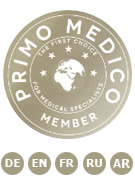In general, children who know what to expect during treatment and go through the procedure with a trusted caregiver are not afraid of radiation. If you succeed in familiarising your child with treatment and procedures, radiation sessions soon become a part of everyday life. The child realises that proton therapy doesn’t hurt and that you are always close by.
If your child is still small, we try to make sure that his or her treatment sessions always take place at the same time of day. This makes it easier to prepare for the anaesthetic. And it makes it easier for your child to get used to therapy.
If your child has to undergo chemotherapy and proton therapy at the same time, we take care of coordinating both treatments. Our waiting areas are arranged with particular attention to the needs of small patients. Children who don’t require anaesthesia can listen to their favourite music during treatment. A microphone is available if you wish to talk to your child or tell them a story. Children who don’t receive anaesthesia can communicate any uneasiness they may feel, both via the microphone and a squeaky toy.
Babies and small children are given a general anaesthetic (sedation) for treatments carried out at CPT so that they stay absolutely still for the duration of the treatment. Sedation is the term used to describe a form of general anaesthetic during which the patient is put into a deep sleep, but continues to breathe spontaneously.
Colleagues from the Department of Paediatric Anaesthetics at the Zurich Children’s Hospital administer anaesthetics at CPT. In some cases, older children are also sedated, especially when individual treatments take a long time, or require uncomfortable positioning. Children whose therapy involves anaesthesia are given a pearl at the beginning of each radiation session. When therapy is completed, the child leaves with a whole chain of pearls (see also: www.mutperlen.ch).
Radiation under anaesthetic – what you need to know
During your first visit to the Center for Proton Therapy, you will have a consultation prior to the procedure with an anaesthetist to inform you of the procedural details and risks involved in sedation. Anaesthetics are administered on an empty stomach to reduce the risk of inhaling stomach contents. Your child should have his or her last light meal four hours before being anaesthetised and should drink a little tea, water or syrup two hours before proton treatment is scheduled.
The sedative (sleep medication) that we use is Propofol, which puts patients into a deep, pleasant sleep. It only lasts for a short time and therefore needs to be continuously administered intravenously to your child. Once the infusion has been turned off, children tend to wake up within 15–30 minutes. As soon as your child is awake, he or she is allowed to eat and drink. Once the anaesthesia team is satisfied with your child’s condition, you’ll be allowed to return home.
